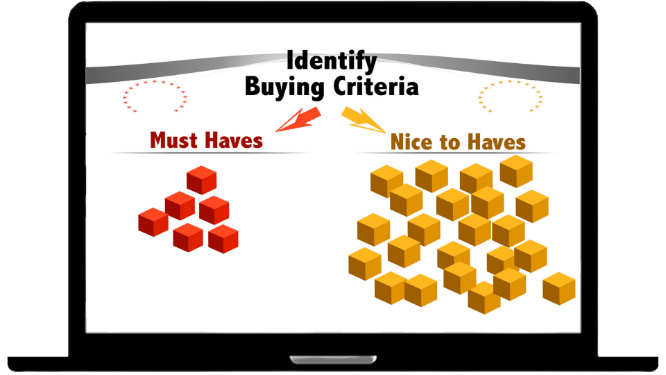The questions sales managers ask their salespeople have an effect on the questions salespeople ask their customers. If you want your salespeople to ask better questions of customers – you the sales manager need to ask better questions of your salespeople!
Here are my five favorite questions to ask of a B2B salesperson. By asking your salespeople these five questions you will help ensure they are set up to win every sales opportunity.
1. “What are the two most important problems this customer has that we can solve?”
Customers are not simply buying a product or service. They are buying a solution to a problem they recognize. By linking your offerings to a customer’s priority problems, your salespeople can reinforce the urgency for the customer to take action rather than do nothing.
This point is especially important if the prospect reached out to your company. In those cases, research shows that as much as 60% of the buying process is complete before the prospect talks to a salesperson. That means the prospect’s definition or understanding of their problem has been shaped by what ever they can get off the internet or, worse, by what your competitors are telling them.
If your salesperson has a prospect who contacted them and has NOT gotten them to talk about the problem or opportunity that triggered the need, they are almost always going to lose the sale. Asking the “most important problems” question of the salesperson reminds them that having that conversation with prospects is critical to winning a sale.
2. “What is your understanding of this customer’s top five buying criteria?”
Salespeople have to demonstrate a deep understanding of the prospect’s needs and what criteria the customer will use to make the buying decision. That’s why I always ask salespeople about the prospect’s top five buying criteria. If a salesperson can’t answer, it tells me one of two things:
a) The customer hasn’t identified their buying criteria, so this opportunity is unqualified (i.e., the customer is not yet serious about purchasing), or
b) The sales rep didn’t ask the customer about their buying criteria—in which case, the salesperson will be unable to meet the customer’s needs, because they don’t understand what those needs are!
3. “What is your strategy to influence the buying criteria so they include our company’s differentiators?”
A customer’s list of buying criteria will be influenced by factors they think of themselves and factors that are influenced by the vendors they are considering (including your competition!). That’s why your salespeople need to understand how to influence buying criteria so that factors most closely tied to your company’s differentiators are seen as priorities by potential customers.
So, ask your salespeople what the customer’s original buying criteria were and how they are going to influence those criteria. The purpose is to get the criteria that favor your offering to move to the top of the customer’s priority list. Do they have to get the customer to consider additional criteria? Attach additional priority to criteria already on the prospect’s lists? How will they do that?
4. “What decision makers have you talked to and is there anyone who may be opposed to our solution?”
In order to craft a winning proposal or presentation, salespeople need to understand the needs and concerns of all key decision makers. Asking this question ensures that they don’t have just one source of information (perhaps the person they first connected with).
You also want to make sure that they have investigated whether there are any decision makers who favor a solution from a different competitor or who think the company does not need to take action at all. If they know about opposition to your solution, ask the salesperson what their strategy is for neutralizing the threat.
5. “Who are we up against, and why do you think we’ll win?”
Asking this question forces the salesperson to focus on topics that will be most persuasive when a prospect is comparing you to the specific competitors they are up against in any deal. If salespeople can’t answer this two-part question, they will be unable to craft a winning proposal or prepare a convincing presentation.
One last note. To answer these five questions, your salespeople need to be able to develop a deep understanding of the customer’s needs and then match that with an equally deep understanding of your company’s offerings and differentiators.
If the salesperson cannot answer these questions, investigate where they (and you, as the manager) are falling short: Do they just need more practice? Or do they need training, mentoring, and/or coaching on how to diagnose customers need? More training on different aspects of your offerings? Put your managerial hat on to find a solution!
Kevin F. Davis is the president of TopLine Leadership, Inc. and the author of “The Sales Manager’s Guide to Greatness” and “Slow Down, Sell Faster!” Both books are available in print, audiobook and eBook on Amazon.com


